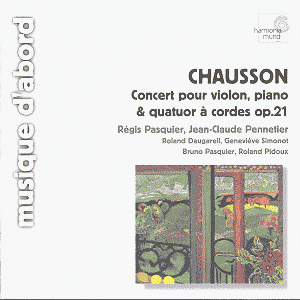Ernest CHAUSSON (1855-1899)
Concert Op.21 (1891)
Pièce en Ut majeur Op.39 (1897)
 Régis Pasquier (violin);
Jean-Claude Pennetier (piano); Roland Daugareil, Geneviève Simonot
(violins); Bruno Pasquier (viola); Roland Pidoux (cello)
Régis Pasquier (violin);
Jean-Claude Pennetier (piano); Roland Daugareil, Geneviève Simonot
(violins); Bruno Pasquier (viola); Roland Pidoux (cello)
Recorded Paris 1983
 HARMONIA MUNDI HMA 1951135
[51:02]
HARMONIA MUNDI HMA 1951135
[51:02]
Crotchet AmazonUK
AmazonUS

Ernest Chausson's Concert pour violon, piano & quatuor a cordes Op.
21 is probably one of his best-known pieces, and quite deservedly so. It
was completed in 1891 and was thus written after the beautiful Symphony in
B flat op. 20. As a whole the Concert has much in common with the
symphony. Both are warmly romantic, large-scale pieces, in which Franck's
influence is clearly audible throughout though Chausson's personality is
so strong that these works are highly personal achievements in their own
terms. This substantial piece of chamber music is cast into four movements
of which the opening Décidé is the weightiest and the
most developed. It opens with a three-note cell hammered out by the piano
and these three notes will provide most of the later thematic material throughout
the piece. Indeed the whole piece gives ample proof of Chausson's ability
to develop his material in sometimes unexpected ways. This long, closely
argued movement is followed by a beautiful Sicilienne acting as some
sort of Scherzo. The third movement Grave is the emotional
heart of the work and one of Chausson's finest inventions. The work ends
with a somewhat lighter, more relaxed and luminous Finale in which
the main theme from the slow movement is quoted twice, emphasizing the beloved
Franckian cyclic pattern informing much of Chausson's music.
We are told nothing at all about the Pièce en Ut majeur pour
violoncelle et piano Op. 39. It was written in 1897 and is thus a
comparatively late work. This is a beautiful short piece that should appeal
to all those who relish, say, Fauré's fine Elégie for
cello & piano.
Both pieces receive highly idiomatic readings by a handful of artists who
are much in sympathy with the music and this reissue is most welcome indeed,
especially in Harmonia Mundi's bargain-priced Musique d'abord series.
The recording made in 1983 still sounds remarkably well. Recommended without
any reservation whatsoever.
Hubert Culot

